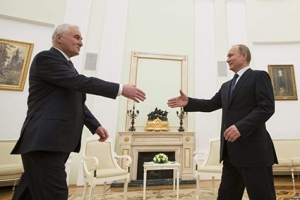South Ossetian Referendum - Who cares?
The de-facto government of occupied Tskhinvali has started preparing for the next referendum. The question that the 25 thousand people who still remain in the region must decided whether or not they want the South Ossetian state to join the Russian Federation with the status of Subject of the Federation. As the de-facto ruler of the occupied region, Leonid Tibilov, explains: “It is necessary to hold a referendum as the results of the previous two referendums were the same.”
A referendum on South Ossetia joining the Russian Federation was held by the de-facto rulers of the separatist region as early as 1992, several weeks after the first and last president of the Soviet Union Mikheil Gorbachov declared the dissolution of the Soviet state. On January 19, 1992, a number of the South Ossetian population, mostly ethnic Ossetians (approximately 28 thousand people) supported the withdrawal of the region from Georgia and ethnic Georgians ousted from Tskhinvali. Eighteen thousand Georgians compactly residing in the region boycotted the referendum. Four months after that referendum, a new flag appeared over Tskhinvali, which informed the world about the birth of the so-called South Ossetian state. Soon, the Russian so-called peacekeepers entered the area and the conflict remained frozen until the August 2008 war. However, in December 2006, the de-facto governors of Tskhinvali reminded the remaining 35 thousand ethnic Ossetian population through a referendum that they live in an independent state. The question now was whether they wanted the independent development of independent South Ossetia. Two years after this referendum, on August 26 2008, the Kremlin recognized independence of the so-called South Ossetia and today Tibilov claims that there is a need to hold a new referendum requesting integration with Russia. The news of preparation of a new referendum was spread in occupied Tskhinvali after the visit of President Putin’s Assistant, Vladimer Surkov. Surkov is coordinating affairs of the so-called independent South Ossetia and the so-called independent Abkhazia in the Kremlin and was in Tskhinvali on an official visit. However, after the Russian media announced Tibilov’s news, the Kremlin voiced the real reasons for Surkov’s visit. President Putin’s press secretary Dmitry Peskov stated that Surkov was in Tskhinvali to study the financial situation of the friend state, with who they “have close integrated relations in many directions.” They spoke only about this issue of “integration” in Tskhinvali since in “South Ossetia” many people support such integration with Russia and it has been known for a while. “As I learned, this is what Mr. Tibilov spoke about with Mr. Surkov,” Peskov said.
Official Tbilisi has yet to respond to the new initiative of the occupied region’s head with an official statement. It seems the Georgian Dream government is too busy and does not have time for the occupied territories at present. If we put it in ex-Prime Minister Ivanishvili’s words, the Garibashvili government is busy with [mijirkvn-ing] Rustavi 2. Only Georgian media, political opposition and analysts shared their opinion about Tibilov’s initiative. Comments from Tbilisi can, as a rule, be divided into several areas. However, everyone agrees that in a similar situation the government should act more radically. Expert in economic issues, Demur Giorkhelidze, calls for the public and government representatives to perceive the reality adequately and have respective reactions. “Is the prison case enough, a pointless fuss? Have you heard anything from Official Tbilisi about this? I haven’t. What does it mean? What will our ‘fathers of the nation’ say about it?” Giorkhelidze asks. Expert in Caucasus issues, Mamuka Areshidze, connects the active discussion of the topic on the Russian side with the visit of the Hague prosecutor to Tbilisi and the investigation of the August 2008 war. Areshidze thinks that it all coincided; thus, it is not excluded that the Kremlin is trying to sabotage the Georgian government in exchange for the Hague court investigation with the issue of integrating the so-called South Ossetia. My version is that the decision of Tibilov to hold a referendum on South Ossetia joining Russia is dictated from Moscow. Active discussion of this topic on the Kremlin’s side is determined by the appearance of the Hague prosecutor in Georgia and re-emergence of the August 2008 war investigation issue. Rebel ex-speaker, Nino Burjanadze, leader of the Democratic Georgia Party, did not miss her chance to comment about the referendum in Tskhinvali. She is known in Georgian politics as a person whom President Putin knows well and if we put it in Georgian slang “she has her ways to the man.” The head of the Democratic Georgia Party outlined this in her statement and recalled her last meeting with Putin. “Following my visits it did not surprise me when the Russian side made careful statements favoring Georgia, but the Georgian government failed to notice it and it seems the government wants to speak to Russia only on issues of its commercial interest. As for the country’s interests, the government is not taking any steps towards it. I am obliged to warn our people once again and tell them that we are losing precious time. I am certain that if the government had started direct dialogue with the Abkhazian and Ossetian sides, we would have a different reality now and such statements would not have been made,” Burjanadze said.
Whether the referendum is held on the occupied territory does not have such importance. Financially, the remaining 25 thousand ethnic Ossetians are fully dependent on Russia and there is a 10 thousand-man Russian military base located there. This is why any serious talk about a referendum asking about integration with the Russian Federation is redundant. This question was answered when, after the ethnic cleansing in the region in 2008, the last ethnic Georgians left the territory. Russia has occupied the territory. Now the main question is whether it is favorable for the Kremlin to unite North Ossetia and South Ossetia and this question has remained unanswered for amost 90 years.
Zaza Jgharkava












